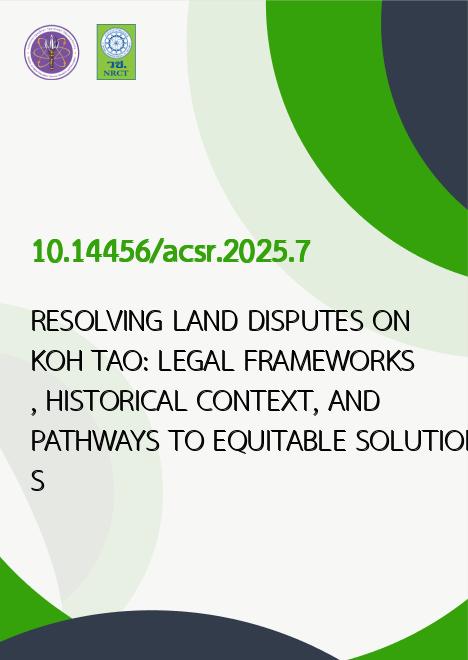
|
RESOLVING LAND DISPUTES ON KOH TAO: LEGAL FRAMEWORKS, HISTORICAL CONTEXT, AND PATHWAYS TO EQUITABLE SOLUTIONS |
|---|---|
| รหัสดีโอไอ | |
| Creator | Akkakorn CHAIYAPONG |
| Title | RESOLVING LAND DISPUTES ON KOH TAO: LEGAL FRAMEWORKS, HISTORICAL CONTEXT, AND PATHWAYS TO EQUITABLE SOLUTIONS |
| Contributor | Nantachai RUKJINDA |
| Publisher | Asian Crime and Society Review |
| Publication Year | 2568 |
| Journal Title | Asian Crime and Society Review |
| Journal Vol. | 12 |
| Journal No. | 1 |
| Page no. | Article 7 |
| Keyword | Land Rights Disputes, Royal Parcel Act 2019, Tourism Development |
| URL Website | https://so02.tci-thaijo.org/index.php/IJCLSI |
| Website title | https://so02.tci-thaijo.org/index.php/IJCLSI/article/view/276927 |
| ISSN | 3027-6896 |
| Abstract | This research examines the complex issue of land disputes in Koh Tao Subdistrict, Koh Phangan District, Surat Thani Province, Thailand. The study employs a qualitative approach, integrating document analysis with in-depth interviews and small group discussions involving key stakeholders. The research's focus stems from discrepancies in land demarcation dating back to 1955 when the Ministry of Finance incorrectly claimed the entire island as state property. This misclassification has hampered the practical application of the Royal Parcel Act of 2019 and led to ongoing conflicts with long-term residents. The study delves into the historical context of land ownership in Koh Tao, tracing its evolution from establishing a prison for political prisoners in the mid-20th century to its current status as a major tourist destination. Key findings reveal a significant disconnect between the legal framework and the lived experiences of Koh Tao's inhabitants. The research highlights the need for a nuanced understanding of land rights within the context of Thailand's legal system and the imperative of balancing the interests of the state and local communities. The study parallels land reform initiatives in Taiwan, proposing that legislation specifically addressing land reform for tourism businesses could offer a more equitable solution for Koh Tao. The study's findings advocate a more holistic approach to land dispute resolution, emphasizing reconciliation, legal clarity, and procedural fairness. The research contributes to a growing body of knowledge on land rights, conflict resolution, and sustainable tourism development in Southeast Asia. |
